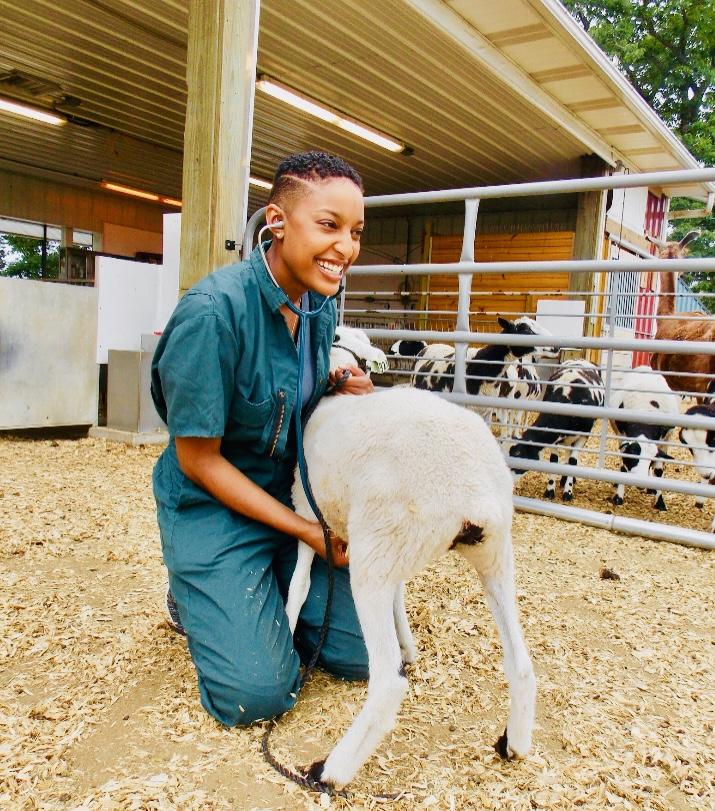-
About
- Leadership & Faculty
- News & Events
-
Academics
- Graduate
- Advanced Clinical Training
- Continuing Education
-
Student Life
-
-
Accommodations
- Our Campus
-
Accommodations
- Graduate Resources
-
-
Research
-
Hospitals & Clinics
- Emergency Care
- Hospital Services
-
Community Outreach
- Volunteer
Devoted to Service and DEI
Cora Evans, V23, earns Tufts Presidential Award for Civic Life

“When I met Cora Evans at an orientation session for incoming first-year students, she struck me with her enthusiasm, curiosity, and vitality,” asserts Suzanne Duncan, a library assistant at Cummings School of Veterinary Medicine at Tufts University. “This has never faltered.”
During her three years on campus, Cora has made significant contributions through serving on Cummings School and Tufts University committees, mentoring students, working on campus, and initiating a new admissions outreach program.
Her actions led Cora to receive the 2022 Presidential Award for Civic Life, the university’s annual award and highest honor for outstanding civic leadership and service. This year 19 students—six undergraduates and 13 graduate students—were recognized.
Born and raised in Raleigh, North Carolina, Cora earned a bachelor’s degree in environmental science from Spelman College in Atlanta. Spelman is a member of the Historically Black Colleges & Universities (HBCU), and Cora planned to pursue veterinary school at another HBCU school but was persuaded to apply to Cummings School by her aunt, who works at Tufts University’s Africana Center.
Coming from an HBCU, Cora was determined to address the lack of diversity she found at Cummings School. Her outgoing nature and willingness to help made Cora a natural fit to get involved. She assisted in Cummings School’s Adventures in Veterinary Medicine program for middle and high school students and served as a student speaker on panels for prospective students.
“Black students reached out to me after participating in those programs and asked me what the climate was like on campus,” Cora explains.
“And I thought that maybe I could help to get more students interested in veterinary medicine. I wondered if admissions would consider targeting students from HBCUs.”
She shared an idea with the School’s Admissions staff to approach HBCUs about Cummings School. Once it was accepted, Cora planned and co-hosted a panel last fall for a new outreach program aimed at attracting black veterinary students. At its conclusion, many students indicated that they planned to apply to Cummings School.
Only two percent of the veterinary workforce in the United States is comprised of Black veterinarians, according to 2017 figures from the U.S. Bureau of Labor and Statistics. “I think there are a lot of black students who are interested in veterinary medicine, but there are so few black veterinarians they have a difficult time finding role models,” Cora contends.
For assistance on campus, Cora has turned to Florina Tseng, professor of wildlife medicine, infectious disease and global health, and associate dean for diversity, inclusion, equity, and climate. “She has been a mentor to me with DEI work as the new dean, and with veterinary medicine,” Cora says. “She has introduced me to people and talked with me about opportunities in the zoo/wildlife medicine fields.”
Since 2020 Cora has served as a student representative on Cummings School’s Anti-Racism Task Force and she is also the school’s student representative on the Tufts Bias and Education Resource Team for the Health Science Schools.
“I like to help prepare the campus community to embrace more diverse populations,” she says. “We need to ensure that the environment they’re coming into is one where they will feel welcomed and accepted because we want them to stay and thrive here.”
Cora has much experience in adapting to new places. As an undergraduate, she took advanced Japanese language and culture classes in Japan and studied abroad in Tanzania. Her veterinary work experience has included stops in Texas, North Carolina, and Sierra Leone, where she worked at a chimpanzee sanctuary.
After graduating from Spelman, Cora served as an assistant English language teacher at a junior high school in rural Japan. She possesses a natural ability to interact with and put others at ease, according to Duncan. “Cora is a ‘people person,’” says Duncan, who has relied upon her to assist the staff and students in Cummings School’s library. “She is always willing to help whenever she is asked or sees a need.”
With one year left before graduation, she is looking forward to the year ahead. “I like trying different things and as I go through clinical rotations, I’ll probably find more that I’m interested in,” Cora shares. “But I would like to do international wildlife work in the future.”
Cora was also included in Worcester Magazine’s round up of local college students working for change.
As a student member of the Cummings School’s Anti-Racism Task Force and as a Cummings School student representative on the Tufts Bias and Education Resource Team for the Health Science schools. Cora’s goal has been twofold: “Get more diverse students onto campus and also making sure the campus was a safe place when they arrived.”